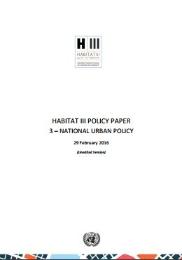Regional development
National Urban Policies and Habitat III
Background
|
Expanding urbanisation is global phenomenon affecting all countries, particularly in emerging and developing economies. It presents challenges and opportunities – both of which can be managed by a government that is well prepared and has a framework for its urban development in place. The OECD has promoted a National Urban Policy (NUP) approach to harnesses the dynamics of urbanisation across sectors and levels of government. It does not replace traditional urban policies, but complements them in order to create an overall, cross-cutting vision of the system of cities and regions integrated in the process of a country’s development. Supporting this approach, the OECD Governance and Territorial Development Directorate has worked closely with United Nations Human Settlements Programme (UN-Habitat) on urban development issues. The OECD has been called upon by the Habitat III Conference Secretariat to co-lead Policy Unit 3 on “National Urban Policies” together with UN-Habitat in the preparatory process of the third United Nations Conference on Housing and Sustainable Urban Development (Habitat III). |
 |
|
This conference is organised every 20 years, and this year, it will take place in Quito, Ecuador, from 17-20 October 2016. The New Urban Agenda which is expected to be agreed at Habitat III is a critical opportunity to support the achievement of the Sustainable Development Goals agreed in New York in September 2015, and in particular Goal #11 on ensuring that cities and human settlements are inclusive, safe, resilient and sustainable. |
|
OECD strategic focus for Habitat III/The New Urban Agenda
The OECD supports the Habitat III process and the New Urban Agenda, in particular from the perspective of promoting the following policy agendas:
- Promoting National Urban Policies (NUP). A NUP is an essential policy framework for all governments in order to establish the connection between the dynamics of urbanisation, demographic changes and the overall process of national development. It is intended to align sectorial policies that affect urban areas and to develop an enabling institutional environment.
- Promoting good urban governance. It is crucial to design, implement, measure and monitor urban performance at the metropolitan scale. Urban governance has a substantial impact on the performance of urban areas, thereby influencing national outcomes.
- Developing subnational finance and organisational knowledge to assess financing for urban development challenges and promote relevant financial tools for urban services and investment.
- Advancing global agendas through urban policies. Cities are well-positioned to help achieve global agreements such as the Sustainable Development Goals, the Sendai Framework, and the Paris Agreement.
Proposed key actions in the run-up and at the Habitat III Conference in Quito
The following key actions are currently planned and/or proposed in the run-up and at the Habitat III Conference in Quito. The OECD would welcome further suggestions and proposals from member countries. The OECD is also keen to support and contribute to relevant actions led by the member countries:
i) Preparation process towards the Conference (April – October 2016)
|
Read the policy paper |
|
ii) Proposed activities at Habitat III Conference in Quito (tbc)
- Official statement / speech at the Conference.
- Organising a high-level panel on National Urban Policy (NUP), co-organised by the OECD, UN-Habitat and Cities Alliance. This panel will discuss from an international organisational point of view how to support member countries to advance NUPs.
- Launching a new programme to support NUP (see iii) below).
- Launching the “State of National Urban Policy” report jointly with the UN-Habitat.
- Participating in high-level panels on different urban issues, hosted by member countries and/or other international organisations (e.g. urban green growth, inclusive urban development, financing of urban infrastructure).
- The OECD appreciates member countries’ active engagement.
iii) A new programme to support NUPs
- The OECD is currently in discussion with UN-Habitat, Cities Alliance and other stakeholders to develop a programme to support NUPs. Its three main pillars will be country advisory services, knowledge management, and capacity development.
- The OECD wishes to contribute to this multi-stakeholder programme through our evidence-based policy assessment (e.g. National Urban Policy Review, State of National Urban Policy report), statistics (e.g. OECD Metropolitan Database and Sub National Finance Database), OECD instrument (Council Recommendation on Effective Public Investment across Levels of Government) and high-level policy fora (e.g. Urban Roundtable of Mayors and Ministers).
- The OECD would welcome the support of member countries in the development and implementation of the Programme.
OECD CONTRIBUTIONS TO THE HABITAT III CONFERENCE TO DATE
Contributions to Policy Paper
Last August, the OECD was selected by the Habitat III Secretariat as a co-lead organisation of the Policy Unit 3 on National Urban Policy (NUP) together with UN-Habitat. Ten Policy Units were created, each of which was led by two international organisations comprised of 20 international experts in various relevant fields.
The main task of the Policy Unit 3 was to develop a policy paper on NUP. Major activities included the following:
- 1st Expert Group Meeting in Paris (12-13 November 2015)
- 2nd Expert Group Meeting in Incheon, Korea (17-18 December 2015)
- Submission of the policy paper draft framework (31 December 2015)
- Expert Group Drafting Meeting in London (25-26 February 2016)
- Submission of the final policy paper (29 February 2016)
- The OECD also participated at expert level (participation in preparatory meetings, written contributions and comments on draft reports) in Policy Unit 4 (Urban Governance, Capacity and Institutional Development) and Policy Unit 8 (Urban Ecology and Resilience).
For detailed information: www.habitat3.org/the-new-urban-agenda/policy.
Participation in official preparatory meetings
- 1st Preparatory Committee meeting in New York in September 2014.
- 2nd Preparatory Committee meeting in Nairobi in April 2015, co-organisation of a side event (National Urban Policies) with UN-Habitat and Cities Alliance.
- Steering group meetings and direct contributions to the Regional Report for Europe (European Cities Report).
- Preparatory meeting for the “Regional Report on Housing and Urban Development for the UNECE region” in Brussels (21 September 2015).
- Thematic Meeting on Metropolitan Areas (6-7 October 2015, Montreal).
- Regional Meeting for Asia-Pacific (21-23 October 2015, Jakarta), organisation of two side events (National Urban Policies – co-organised with UN-Habitat / Cities Alliance, Urban Green growth).
- International Conference on National Urban Policies in the preparation of Habitat III (14 16 December 2015, Incheon, Korea).
- Thematic Meeting on Financing (9-11 March 2016, Mexico City).
- Regional Meeting for Europe (16-18 March 2016, Prague), organisation of two side events (National Urban Policies – co-organised with UN-Habitat, Cities Alliance and UNECE, Land Use – co-organised with Lincoln Institute).
Other high-level policy dialogues on Habitat III
- OECD Territorial Development Policy Committee (27 November 2014) in the presence of Dr. Joan Clos.
- 6th OECD Roundtable of Ministers and Mayors in Mexico City (16 October 2015).
- COP21 side event on Sustainable Urban Development and Green Growth (3 December 2015).
- International meeting in preparation for Habitat III hosted by Government of Brazil in São Paulo (29 February – 1 March 2016)
OECD work to support the New Urban Agenda
- OECD National Urban Policy Reviews: completed for five countries (Poland, Korea, Chile, Mexico, and China), on-going in Kazakhstan and planned for Vietnam. The NUP framework was presented as a chapter in Regional Outlook 2014.
- OECD Metropolitan Database.
- Urban Green Growth studies: currently focusing on rapidly urbanising Asian cities – Bangkok (Thailand), Iskandar (Malaysia), Haiphong (Vietnam), Bandung (Indonesia) and Cebu (Philippines). Extending the study to LAC and/or African cities is being considered.
- OECD work on multi-level governance: (i) Contribution to a worldwide Observatory on sub national finances and organisation; (ii) Implementation of the OECD Council Recommendation on Effective Public Investment across levels of government, notably through a comprehensive set of indicators which can apply to both OECD and non-member countries.
- Study on resilient cities.
- The OECD collaborates closely with UN Habitat on delivering inputs for measuring the urban resilience goal of the SDG’s. OECD surveys are launched to monitor the implementation of the OECD Recommendation on the Governance of Critical Risks, based on which indicators will be created on the level of resilience of OECD countries against future disasters.
Related Documents
